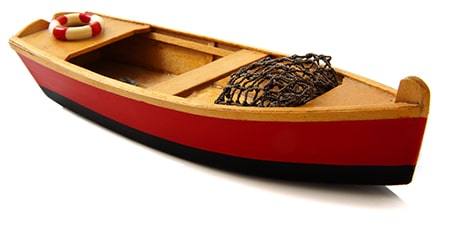The New Maritime Law of the UAE
 The maritime industry has long been a cornerstone of global trade, and nowhere is this more evident than in the United Arab Emirates (UAE). As a nation with a rich maritime heritage and a strategic location at the crossroads of international shipping routes, the UAE has continuously invested in bolstering its maritime sector. The recent release of Federal Decree-Law No. 43 of 2023, known as the New Maritime Law, represents a significant milestone in the evolution of the UAE's maritime industry. In this article, we will explore the key provisions of the New Maritime Law and examine how they are poised to shape the future of maritime operations in the UAE.
The maritime industry has long been a cornerstone of global trade, and nowhere is this more evident than in the United Arab Emirates (UAE). As a nation with a rich maritime heritage and a strategic location at the crossroads of international shipping routes, the UAE has continuously invested in bolstering its maritime sector. The recent release of Federal Decree-Law No. 43 of 2023, known as the New Maritime Law, represents a significant milestone in the evolution of the UAE's maritime industry. In this article, we will explore the key provisions of the New Maritime Law and examine how they are poised to shape the future of maritime operations in the UAE.
Vessel Registration
The registration of a vessel is delineated in various provisions of the New Maritime Law. Article 7 defines a vessel as a tangible movable subject to the rules applicable to tangible movables, unless ownership by possession is involved. Notably, Article 13(b) of the New Maritime Law represents a significant development, allowing foreign individuals or companies domiciled in the UAE, or those having a business center, to register vessels in their names.
In contrast to the capped foreign ownership set at 49% under the Repealed Maritime Law, this provision establishes a more inclusive and accessible framework, potentially broadening investment opportunities within the maritime sector. Details regarding implementation procedures and other pertinent matters related to the New Maritime Law are anticipated to be disclosed in due course. Meanwhile, Article 368(2) stipulates that existing resolutions and regulations under the Repealed Maritime Law will remain applicable, provided they do not conflict with the New Maritime Law, until new executive regulations are promulgated.
Charterers of vessels registered abroad are allowed, under Article 18 of the New Maritime Law, to apply for the registration of their vessels in the UAE and fly the UAE flag, provided they fulfill the registration criteria specified in Article 13. Notably, vessels without equipment must have a charterparty duration of no less than six months for registration approval. Intriguingly, Article 19 grants owners of vessels registered under the UAE flag permission to apply for flying the flag of another country if the vessel is to be chartered without equipment. Specific application procedures for this provision are yet to be determined.
Age restrictions for vessel registration under the Repealed Maritime Law were nonexistent; however, Article 13(1)(c) of the New Maritime Law mandates that vessels be no older than 20 years from the completion date of their shipbuilding contract, with passenger ships allowed registration if they are not more than 10 years old. Furthermore, in accordance with paragraph 2 of Article 7, the UAE Ministry of Energy & Infrastructure is mandated to establish a "vessel register" for registering vessels, encompassing various types, classifications, activities, and operational areas, in line with forthcoming executive regulations. This registry represents another positive stride toward encouraging vessel owners to register their vessels in the UAE.
Moreover, Article 9(3) of the New Maritime Law permits the registration of shipbuilding contracts for vessels under construction, with registration procedures to be completed by the shipbuilder, as stipulated in the law. Additionally, Article 9(1) necessitates the Ministry's approval of vessel specifications for registration in a specialized register named the "Register of Ships Under Construction."
Dispute Resolution Mechanism
In addition to streamlining vessel registration procedures, the New Maritime Law introduces a dedicated framework for resolving maritime disputes. Article 4 of the law aligns with UAE Federal Law No. 6 of 2018 on Arbitration, facilitating the ratification of settlements or mediations of maritime disputes. This provision reflects the UAE's commitment to international best practices in dispute resolution and aims to provide stakeholders with clarity and certainty in navigating complex legal issues.
Ship Arrest Procedures
A creditor, encompassing suppliers, lenders, or contractors, possesses the authority to detain a vessel by court order if the filed claim qualifies as a "maritime debt" under the New Maritime Law. These debts must be linked to maritime activities or transactions such as ship chartering, shipbuilding or repair contracts, cargo transportation, and ship navigation. Such transactions typically result in a debt or obligation between the ship owner and the creditor, enabling the creditor to seek vessel detention through an arrest application.
The ship arrest provisions outlined in the New Maritime Law closely mirror those of the Repealed Maritime Law. Article 54(1) permits the creditor to seek the arrest of the specific vessel associated with the debt or any other vessel owned by the same debtor at the time of the arrest order application. However, Article 54(2) prohibits the arrest of sister vessels in scenarios involving disputes over vessel ownership, disputes between joint owners regarding operation and distribution of proceeds, vessel mortgages or securities, or disputes arising from vessel sale contracts.
 Regarding charterer debts, Article 55 allows the creditor to apply for vessel arrest during the charterparty period if the charterer bears sole liability for the maritime debt related to the vessel and holds navigation management rights. This provision extends to cases where the maritime debt is attributed to a debtor other than the vessel's owner. Unlike the Repealed Maritime Law, which mandates filing the substantive claim within 8 days of the arrest order date, Article 59 of the New Maritime Law requires claimants to file within 5 working days. The substantive claim hearing must be scheduled within 15 days from the court minutes' enforcement date of the arrest order for judgment on vessel arrest and sale confirmation. The judgment can be appealed within 15 days, and the Court of Appeal is mandated to issue its judgment within a week without referral to the case management office. This procedural change accelerates the dispute resolution process in maritime disputes, offering litigants a means to bypass lengthy court procedures. Notably, Article 4 of the New Maritime Law incorporates provisions of UAE Federal Law No. 6 of 2018 on Arbitration concerning the ratification of settlement or mediation minutes in maritime disputes, marking a significant aspect of dispute resolution facilitation.
Regarding charterer debts, Article 55 allows the creditor to apply for vessel arrest during the charterparty period if the charterer bears sole liability for the maritime debt related to the vessel and holds navigation management rights. This provision extends to cases where the maritime debt is attributed to a debtor other than the vessel's owner. Unlike the Repealed Maritime Law, which mandates filing the substantive claim within 8 days of the arrest order date, Article 59 of the New Maritime Law requires claimants to file within 5 working days. The substantive claim hearing must be scheduled within 15 days from the court minutes' enforcement date of the arrest order for judgment on vessel arrest and sale confirmation. The judgment can be appealed within 15 days, and the Court of Appeal is mandated to issue its judgment within a week without referral to the case management office. This procedural change accelerates the dispute resolution process in maritime disputes, offering litigants a means to bypass lengthy court procedures. Notably, Article 4 of the New Maritime Law incorporates provisions of UAE Federal Law No. 6 of 2018 on Arbitration concerning the ratification of settlement or mediation minutes in maritime disputes, marking a significant aspect of dispute resolution facilitation.
Under the Repealed Maritime Law, ship owners and their vessels lacked protection when creditors filed claims for ship arrests. However, Article 56 of the New Maritime Law addresses this gap by mandating creditors to provide a financial guarantee covering the safety and security needs of the affected vessel and its crew throughout the arrest period before the Court grants an arrest order. This requirement aims to alleviate concerns of defaulting ship owners or charterers regarding their abandoned seafarers during legal proceedings. Notably, Article 56 specifies that the financial guarantee amount is deemed a judicial expense, with costs related to the crew and vessel during the arrest period prioritized and settled ahead of any creditor claims from the execution proceeds.
Regarding security measures for releasing arrested vessels, the New Maritime Law streamlines procedures in line with international standards by recognizing a letter of undertaking (LOU) as a valid security measure to lift a ship arrest, unlike the cumbersome requirements under the Repealed Maritime Law. Article 57(2) stipulates that UAE Courts shall accept LOUs or other securities for vessel release. LOUs, typically issued by Protection and Indemnity Clubs (P&I Clubs), serve as globally recognized instruments to secure maritime claims, ensuring that the mutual insurance association will honor the financial guarantee up to the specified amount in the LOU if a valid claim arises. Furthermore, Article 57(3) defers to the Executive Regulations of the law to delineate rules for accepting LOUs issued by P&I Clubs or acceptable financial institutions. It's important to note that the New Maritime Law specifies that LOUs are not acceptable in disputes over vessel ownership, possession, or disputes between joint owners regarding operation and proceeds distribution, in which case the vessel remains under arrest until a final judgment is rendered in the substantive claim.
 Conclusion
Conclusion
In conclusion, the enactment of the New Maritime Law represents a significant step forward for the UAE's maritime industry. By addressing key areas such as vessel registration, dispute resolution, and ship arrest procedures, the law sets the stage for a more robust and efficient maritime sector. As the UAE continues to solidify its position as a global maritime hub, adherence to the provisions outlined in the law will be crucial for fostering growth and sustainability in the sector. With its comprehensive approach to addressing various aspects of maritime operations and legal frameworks, the New Maritime Law positions the UAE for continued success in the global maritime arena. As stakeholders navigate the evolving landscape, the New Maritime Law stands as a beacon of progress and innovation in the UAE's maritime industry.
 English
English
 عربي
عربي Русский
Русский 官话
官话 português
português
 Türk
Türk 



.jpg&w=120&h=80&zc=1)




